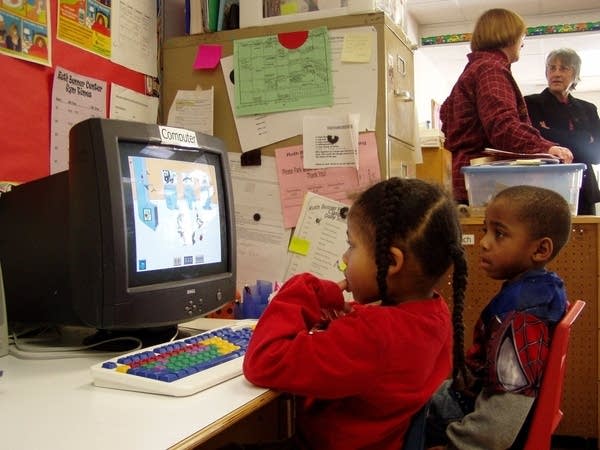Preschool literacy program shows long-term results

In a St. Paul Head Start classroom, Karen Boehne-Warner is teaching her young students some of the basic skills they'll need in kindergarten.
"We're going to find out what number goes up on our calendar today," Boehne-Warner tells her students. "Ready to help me count?"
When five-year-old Tarek correctly identifies today's date, Boehne-Warner tells him to kiss his brain. Tarek promptly kisses his hand and touches his head. Boehne-Warner is also teaching Tarek and his classmates letters and words, which will help them learn to read.

Boehne-Warner's classroom is filled with children's books, and words are everywhere, labeling objects from the computer to the music shelf. That's a major piece of the Words Work program. Another key component is literacy mentors like Lorrie Dahlquist, who are in the classroom every day giving teachers tips and resources.
Create a More Connected Minnesota
MPR News is your trusted resource for the news you need. With your support, MPR News brings accessible, courageous journalism and authentic conversation to everyone - free of paywalls and barriers. Your gift makes a difference.
"Frankly, Head Start teachers have a lot of paperwork and other things to do, they don't often have a lot of time," said Dahlquist. "So I think that's where the literacy mentor piece comes in, to support them, to say, can I get this resource for you, and help them put it together and kind of give them that little nudge to use it."
In addition to working extensively with teachers, Words Work also helps parents, many of whom don't speak English, teach their children to read. Words Work sends home a literacy kit with each child that includes books, paper, markers, crayons, stickers, scissors and activities.
Children in the program are low-income, and half of them speak other languages at home, so they may not have any children's books in English. The Saint Paul Foundation's director of program plannning, Claire Chang, said it's challenging for parents who don't speak English to read with their children.
"Some of them came from languages that were character-based, or Arabic, where the reading operates in the opposite direction," Chang said. "And so we actually taught parents how to use the books, how to flip through them, these are the parts of the book, this is the cover, this is the author."

The first children to go through the Words Work program are now in sixth grade, and the Saint Paul Foundation has been tracking their academic progress the entire time. Project coordinator Beth Menninga said researchers found that Words Work children outperform other children in Head Start programs, other students in St. Paul public schools and even the national average.
"Our researchers found when they looked at the raw scores of the children on these achievement tests that in fact, they were at 86 percent above or at average in reading," Menninga said. "And 88 percent at or above average in math."
Menninga said the results are particularly impressive, because prior to starting the Words Work program, only 39 percent of these children scored at or above average. Menninga said the results show that an early childhood program can have a long-term impact on the academic success of students.
The Saint Paul Foundation plans to share its findings with policymakers. The foundation's Claire Chang said if state leaders want to close the achievement gap, they should make Words Work available to other low-income children.
"We as a foundation do not have the resources to take this to scale and sustain it over the long haul so we can help all of Minnesota's children," said Chang. "I wish we could."
Chang estimates that Words Work costs $500 per child per year for additional staff, teacher training and resources. That's on top of the cost of Head Start, which is more expensive than child care. While Gov. Pawlenty and legislative leaders have called for more state funding for early childhood education, state policymakers have yet to propose state dollars for a preschool literacy program like Words Work.


